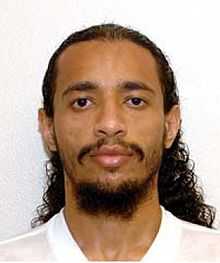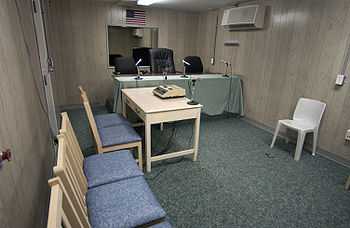Ahmed Abdul Qader
| Ahmed Abdul Qader | |
|---|---|
 Guantanamo captive Akhmed Abdul Qadir wearing the white uniform issued to compliant captives. | |
| Arrested |
2001 Pakistan Pakistani authorities |
| Released |
2015-01-14 Estonia |
| Citizenship | Yemen |
| Detained at | Guantanamo |
| Alternate name |
|
| ISN | 690 |
| Charge(s) | extrajudicial detention |
Ahmed Abdul Qader is a citizen of Yemen, held in extrajudicial detention in the United States Guantanamo Bay detainment camps, in Cuba.[1][2] His detainee ID number is 690. The Department of Defense estimated that Qader was born in 1984, in Sana'a, Yemen.
Ahmed Abdul was cleared for release by the Guantanamo Review Task Force.[3][4][5][6][7] He was accepted as a refugee by Estonia on January 14, 2015.[2][8]
Official status reviews
Originally the Bush Presidency asserted that captives apprehended in the "war on terror" were not covered by the Geneva Conventions, and could be held indefinitely, without charge, and without an open and transparent review of the justifications for their detention.[9] In 2004 the United States Supreme Court ruled, in Rasul v. Bush, that Guantanamo captives were entitled to being informed of the allegations justifying their detention, and were entitled to try to refute them.
Office for the Administrative Review of Detained Enemy Combatants

Following the Supreme Court's ruling the Department of Defense set up the Office for the Administrative Review of Detained Enemy Combatants.[9]
Following Freedom of Information Act requests the DoD published documents from Ahmed Abdul's annual OARDEC hearings from 2004, 2005, 2006 and 2007.[13][14][15][16]
Scholars at the Brookings Institute, lead by Benjamin Wittes, studied these documents, and listed the captives still held in Guantanamo in December 2008, according to whether their detention was justified by certain common allegations[17] According to their study:
- Ahmed Abdul Qader was listed as one of the captives who "The military alleges ... are associated with both Al Qaeda and the Taliban."[17]
- Ahmed Abdul Qader was listed as one of the captives who "The military alleges that the following detainees stayed in Al Qaeda, Taliban or other guest- or safehouses."[17]
- Ahmed Abdul Qader was listed as one of the captives who "The military alleges ... took military or terrorist training in Afghanistan."[17]
- Ahmed Abdul Qader was listed as one of the captives who "The military alleges ... fought for the Taliban."[17]
- Ahmed Abdul Qader was listed as one of the captives who "The military alleges that the following detainees were captured under circumstances that strongly suggest belligerency."
- Ahmed Abdul Qader was listed as one of the captives who "The military alleges ... served on Osama Bin Laden’s security detail."[17]
- Ahmed Abdul Qader was listed as one of the captives who was ab "al Qaeda operative".[17]
- Ahmed Abdul Qader was listed as one of the captives who "deny affiliation with Al Qaeda or the Taliban yet admit facts that, under the broad authority the laws of war give armed parties to detain the enemy, offer the government ample legal justification for its detention decisions."[17]
- Ahmed Abdul Qader was listed as one of the captives who "The military alleges ... admitted fighting on behalf of Al Qaeda or the Taliban."[17]
Ahmed Abdul chose to participate in his initial 2004 Combatant Status Review Tribunal.[18] The United States Department of Defense published an 8 page summary of the transcript of his hearing.
Ahmed Abdul requested fellow captive Abdul Aziz, the Al Wafa director, as a witness.[18] Abdul Aziz stated he did not remember ever meeting Qadar, and since he didn’t remember him Ahmed Abdul could never have worked for him.
Habeas corpus petition
Ahmed Abdul's habeas corpus petition was turned down in 2011.[8][19]
Third party comments
On December 24, 2014, Linda Greenhouse, a long-time commentator on the United States Supreme Court, writing in the New York Times, wrote about Ahmed Abdul habeas corpus petition, and comments made by more senior judges on his case.[20]
Sara Davidson, writing in the New Yorker magazine and Well Bennett, writing for Lawfare, both commented on his case, following his transfer to Estonia.
References
- ↑ OARDEC. "List of Individuals Detained by the Department of Defense at Guantanamo Bay, Cuba from January 2002 through May 15, 2006" (PDF). United States Department of Defense. Archived from the original on 2007-09-30. Retrieved 2006-05-15.
 Works related to List of Individuals Detained by the Department of Defense at Guantanamo Bay, Cuba from January 2002 through May 15, 2006 at Wikisource
Works related to List of Individuals Detained by the Department of Defense at Guantanamo Bay, Cuba from January 2002 through May 15, 2006 at Wikisource
- ↑ 2.0 2.1 Margot Williams (2008-11-03). "Guantanamo Docket: Ahmed Abdul Qader". New York Times. Retrieved 2010-10. Check date values in:
|accessdate=(help) - ↑ Carol Rosenberg (2012-09-21). "U.S. names 55 Guantánamo captives cleared for release". Miami Herald. Archived from the original on 2012-09-23.
- ↑ Danica Coto (2012-09-21). "U.S. releases list of Guantanamo detainees cleared for transfer". Toronto Star. Archived from the original on 2012-09-23.
The U.S. Justice Department has made public the names of 55 Guantanamo prisoners who have been approved for transfer to the custody of other countries, releasing information sought by human rights organizations. The announcement, which reverses a 2009 decision, was a surprise to organizations that had filed FOIA requests seeking the information.
- ↑ "US releases names of 55 Guantanamo detainees approved for transfer". freedetainees.org. 2012-09-23. Archived from the original on 2012-09-23.
- ↑ Fausto Biloslavo (2012-09-23). "Quei reclusi di Guantanamo che possiamo trovarci in casa" [Those inmates from Guantanamo that we can find in the house]. Il Giornale. Archived from the original on 2012-09-23.
- ↑ "Current Guantanamo Bay Detainee-Petitioners Approved For Transfer (Sept. 21, 2012)". Department of Justice. 2012-09-21. Archived from the original on 2012-09-23.
- ↑ 8.0 8.1 Sara Davidson (2015-01-15). "Sent to Guantánamo as a Teen-Ager, and Now to Estonia". New Yorker magazine. Archived from the original on 2015-01-17. Retrieved 2015-01-16.
When Akhmed Abdul Qadir Hussain was eighteen (or a little younger, by some accounts), in early 2002, he was arrested by the Pakistani police, who gave him to American forces, who sent him to Guantánamo Bay.
- ↑ 9.0 9.1 "U.S. military reviews 'enemy combatant' use". USA Today. 2007-10-11. Archived from the original on 2012-08-11.
Critics called it an overdue acknowledgment that the so-called Combatant Status Review Tribunals are unfairly geared toward labeling detainees the enemy, even when they pose little danger. Simply redoing the tribunals won't fix the problem, they said, because the system still allows coerced evidence and denies detainees legal representation.
- ↑ Guantánamo Prisoners Getting Their Day, but Hardly in Court, New York Times, November 11, 2004 - mirror
- ↑ Inside the Guantánamo Bay hearings: Barbarian "Justice" dispensed by KGB-style "military tribunals", Financial Times, December 11, 2004
- ↑ "Annual Administrative Review Boards for Enemy Combatants Held at Guantanamo Attributable to Senior Defense Officials". United States Department of Defense. March 6, 2007. Retrieved 2007-09-22.
- ↑ "Summary of Evidence for Combatant Status Review Tribunal -- Qader, Ahmad Abdul". Guantanamo: OARDEC. 2004-10-20. Retrieved 2015-01-16.
- ↑ "Unclassified Summary of Evidence for Administrative Review Board in the case of Qader, Ahmed Abdul". Guantanamo: OARDEC. 2005-11-23. Retrieved 2015-01-16.
- ↑ "Unclassified Summary of Evidence for Administrative Review Board in the case of Qadir, Akhmed Abdul". Guantanamo: OARDEC. 2006-11-03. Retrieved 2015-01-16.
- ↑ "Unclassified Summary of Evidence for Administrative Review Board in the case of Qadir, Akhmed Abdul". Guantanamo: OARDEC. 2007-12-20. Retrieved 2015-01-16.
- ↑ 17.0 17.1 17.2 17.3 17.4 17.5 17.6 17.7 17.8 17.9 Benjamin Wittes, Zaathira Wyne (2008-12-16). "The Current Detainee Population of Guantánamo: An Empirical Study". The Brookings Institute. Retrieved 2010-02-16. mirror
- ↑ 18.0 18.1 "Summarized Unsworn Detainee Statement". Guantanamo: OARDEC. date redacted. Retrieved 2015-01-16. Check date values in:
|date=(help) - ↑ Andy Worthington (2011-11-29). "As Judges Kill Off Habeas Corpus for the Guantánamo Prisoners, Will the Supreme Court Act?". Retrieved 2015-01-16.
Reviewing his case, in light of the Circuit Court’s rulings, Judge Walton denied Hussein’s habeas petition for a variety of reasons that do not exactly encourage overwhelming support for the direction the habeas hearings have taken. Following a previous Circuit Court ruling (in the case of a Yemeni called Hussein Almerfedi), it was considered significant that Abdul Qader Ahmed Hussein had stayed at two mosques in Pakistan run by the vast and apolitical missionary organization Jamaat al-Tablighi, which is regarded, by Justice Department lawyers and the Circuit Court, as a front for terrorism, even though it has millions of non-terrorist members worldwide, and using it to justify detention is akin to imprisoning Catholics for the actions of the IRA. - See more at: http://www.andyworthington.co.uk/2011/11/29/as-judges-kill-off-habeas-corpus-for-the-guantanamo-prisoners-will-the-supreme-court-act/#sthash.UrcKQccW.dpuf
- ↑ Linda Greenhouse (2014-12-24). "Guantanamo Dreams". New York Times. Archived from the original on 2015-01-16.
Judge Edwards raised a similar alarm in another Guantánamo case, an appeal by a Yemeni detainee, Abdul al-Qader Ahmed Hussain, a teenager when he was captured in early 2002 in Faisalabad, Pakistan.